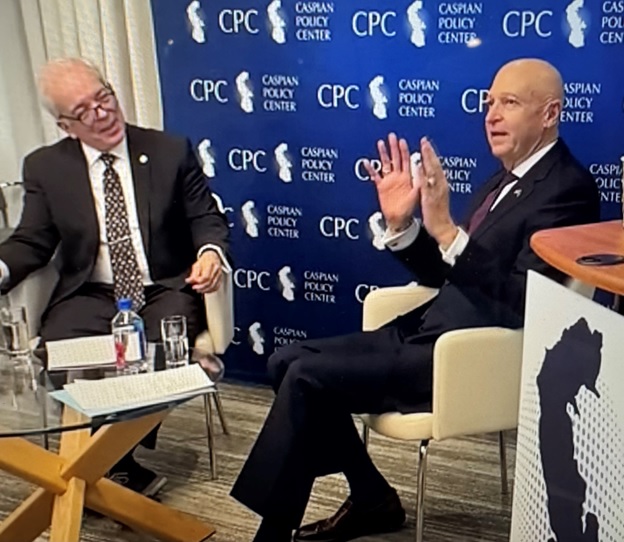

Turkmenistan Is a Stable Bridge between Asia and Europe, Says Former US Envoy at Caspian Policy Center
By Elaine Pasquini
Washington: Matthew Klimow, US ambassador to Turkmenistan from 2019 to 2024, was the special guest at the Caspian Policy Center (CPC) on January 29, 2025.
Following welcoming remarks by CPC President Efgan Nifti, Chairman Richard Hoagland, former ambassador to Tajikistan and Kazakhstan, noted that while Turkmenistan’s government does have “some unusual policies… it’s a real country that forms part of Central Asia.”
Opening the discussion, Eric Rudenshiold, CPC senior fellow and former director of the National Security Council for Central Asia, pointed out how little is known about Turkmenistan, a former Soviet republic of 6.5 million people. But due to its location and being home to the world’s fourth largest natural gas reserves, it can obviously be a “real key player,” he said.
Klimow revealed that his biggest challenge as ambassador was trying to paint an accurate picture of Turkmenistan, especially for officials in Washington. Even today, many years of negative reporting, which accentuated eccentricities in their decision-making and a dismal human rights record, have obfuscated and overshadowed the progress that the country has made over the years.
Addressing misconceptions about the country, Klimow stated that
Turkmenistan is “not another North Korea, the economy is not on the verge of bankruptcy and positive neutrality is not just a slogan.” He acknowledged there are “eccentricities in Turkmenistan’s decision-making,” but explained that was because they make “rational decisions from their mindset, not always apparent to us with our American-shaded glasses.”
The US, nevertheless, has a good relationship with the small Central Asian country, Klimow continued, relating that long-time Foreign Minister Rasit Meredow described the relationship to him as being “at a new level.”
Following its policy of “positive neutrality,” Turkmenistan strives for good relations with all countries around the world, as well as in the region, including Moscow, the ambassador said. Although, after Russia’s invasion of Ukraine, Ashgabat did send clear diplomatic messages that they were very displeased with Moscow’s actions.
In addition, Turkmenistan is not in debt to China or anyone else. They have a good functioning economic relationship with China, which operates the Galkynysh vast natural gas fields, but they don’t own anything there, he said.
Stability, Klimow explained, is the driving factor in terms of Turkmenistan’s strategic priorities and many of their decisions. But their view of what contributes to stability, he pointed out, “may be different than what we see as important.”
One factor relating to stability is Turkmenistan’s relationship with Afghanistan, their neighbor on the southeast side of a 500-mile shared border. “They’ve kept the Taliban quiet, and they’ve worked at this for decades for a general relationship that works to their benefit,” he stressed.
Turkmenistan has solid relationships with its other C5 members: Kazakhstan, Uzbekistan, Tajikistan, and Kyrgyzstan. Furthermore, Ashgabat, the Turkmen capital, is only 15 miles from the Iranian border, “and they have a functioning…somewhat cordial relationship with Iran,” the ambassador said.
With respect to Turkmenistan’s government, 43-year-old Serdar Berdimuhamedow became the third president of the country, taking over from his father Gurbanguly Berdimuhamedow in 2022.
Gurbanguly remains in the government, however, serving as senior advisor to his son. Strategic long-term decisions are made, the ambassador said, after the president confers with his father and cabinet ministers who, Klimow said, were not just “rubber stamps.”
“They don’t rush into decisions; they are methodical in their decision-making,” he continued. “They handle matters quietly behind the scenes, not in the media.”
And when foreign dignitaries, heads of state or senior officials from the United States visit Turkmenistan, Serdar meets with them one-on-one. “I think that is a strong and powerful signal,” Klimow said.
Reflecting on his five years as ambassador to Turkmenistan, Klimow discussed the importance of observing the basic courtesies of Turkmen culture, such as taking your shoes off before you walk into a home and acknowledging their ancient culture of which they are so proud.
One important aspect of US-Turkmenistan relations, he related, is the exchange programs that the US offered, which provided a way to expose young Turkmen, university students, and, in the case of the US State Department’s FLEX program, high school students, to a broader view of the world and Western ideas.
Visiting archeological sites under restoration was an extraordinary experience, he said, particularly watching Getty Museum restorers work on a fifth-century Buddha statue that was found in the ancient city of Merv in 1960. New York City’s Metropolitan Museum also has an archaeological project in southeast Turkmenistan’s Mary Province.
The programming that the small $3 million budget USAID provided in Turkmenistan was well-received, Klimow said. The water projects were very much appreciated, along with entrepreneurship grants. “It was a small budget with an outsized impact, punching above its weight class,” he insisted. If the current administration should ask for his advice, Klimow said, he would tell them: “It’s a little investment for an outsized impact, and, yes, it is welcomed. People want what the United States is offering.”
In addition, American experts have actively been advising them on water issues, he said. USAID also funded a program of installing water monitoring devices, so the water flow is now being gauged and measured to help them better shuttle water to where it is needed.
“We’re in a fight for influence in Central Asia,” Klimow said. “We all believe that the connective tissue between Europe and Asia runs through Central Asia. Russia has historic ties to the former Soviet republics. China is close by, and we are far away. That is a disadvantage for us. That distance matters. So, we have to be there.”
(Elaine Pasquini is a freelance journalist. Her reports appear in the Washington Report on Middle East Affairs and Nuze.Ink.)

